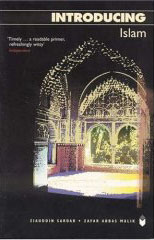 A postcolonial studies professor explains his religion
A postcolonial studies professor explains his religionZiauddin Sardar's 'Introducing Islam' is an uncritical look at Islam, Islamic culture and the Islam world. Claims of perfection abound. The four perfect caliphs? Perfect rule? Perfect societies? Morocco and Malaysia as the only true centres of multiculturalism?
The triumphalist tone (We invented everything and we invented them first, the others just stole from us.) throughout belies the claimed modesty in the beginning. The hints and sly digs at theft and plagarism coupleswith the outright charges do not appear to convey much about co-existence and compromise. Similarly, there is an initial claim about not blaming others for the ills in the Islamic world and, yet, at the end, blaming the West for everything, is one of the characteristics of this volume.
And there is finally a call for the Islamisation of knowledge including science and social sciences.
Is this a worthwhile book? Well, it really depends. In a superficial sense, Sardar does echo Chomsky's 'Year 501: The Conquest Continues', oh dear. However, this book does give a glimpse to the mindset of some Muslims, and that, in itself, is valuable if Islamic Terror is to be curbed.
For a better glimpse of a true grassroots political manifesto relating to Islamic Terror, one is advised to read the Hamas charter.
2 comments:
Yes Islamist nationalists continue to be emboldened by the failure of the US policy in the Mid-East. One wonders if it makes sense for the US to remain involved. As they say "only a fool fights in a burning house".
The US can, of course, choose to be isolationist. Again, the US can also adopt a 'realist' policy (think Kissinger and others). The current administration, despite your distaste for them, has seen a shift from a neo-con position to that of a realist position. However, what happens when Islamists (I doubt if they are nationalists at all, that was the 50s) overruns several secular nations and start exporting their brand of fanaticism?
Post a Comment